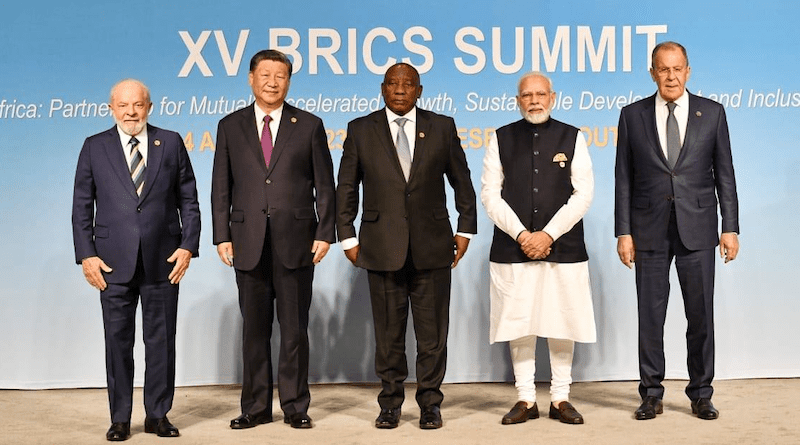BRICS: Yet Another Debating Forum – OpEd
With the United Nations Organisation steadily losing its relevance and no more enjoying the confidence of the world community that it can ensure world peace and international cooperation, there is widespread view that the UN General Assembly is now only a discussion forum.
In such circumstances, several international forums have been formed over the years such as NATO, G-20, G-7 , QUAD, SAARC, ASEAN, Organisation of Islamic Cooperation (OIC) , African Union (AU) , Shanghai Cooperation Organisation, OPEC, and so on. All these bodies meet periodically and discuss various issues without any reference to UNO.
BRICS is one such forum and the five member countries meet at regular intervals like every other above mentioned forums and the recent meeting took place at Johannesburg. What is particularly surprising is that while BRICS over the last several years is not known to have achieved anything tangible, it is reported that a few other countries have expressed interest in joining BRICS . A few of the interested countries have been shortlisted to join BRICS. It is not clear as to what is the criteria for admitting a few countries in BRICS and not enlisting other interested countries .
Further, existing and new member countries of BRICS are also involved in several other world forums, where deliberations take place on any particular matter that may not be palatable to one or other member countries of BRICS.
If one would carefully look into the discussions in the recent BRICS meeting at Johannesburg, it would become clear that the tone of speeches made by the leaders were cosmetic and concealed more than what they revealed. The proceedings appear to be a routine exercise with usual handshakes and bordering on boredom for the onlookers.
India and China are two members of BRICS and both these countries have really hostile relationships these days and the military of both these countries are facing each other on the border and bloody military conflicts have taken place several times, resulting in loss of lives and injuries on both the sides. India says that China is occupying thousands of kilometres of Indian territory. China is claiming Arunachal Pradesh in India as Chinese territory.
In several international forums, China has opposed India on several counts. It is certainly farcical to think that both these countries can cooperate in the BRICS forum. As a matter of fact, when Prime Minister Modi met Chinese President Xi in Johannesburg in person for discussions, eyebrows were raised in India and many in India thought that Mr. Modi should have avoided this meeting with Chinese President. Further, after this meeting, there is a controversy as to who sought this meeting whether India or China. China says that the meeting was sought by India, and India disagrees.
Russia is another member of BRICS and Russian President has avoided visiting Johannesburg, probably thinking that attending BRICS meeting was not a matter of priority . It is widely known that Russia and China, two member countries of BRICS, are forming sort of axis to confront the NATO countries and USA in several ways. Other member countries of BRICS namely India, Brazil and South Africa certainly would not be comfortable with such axis.
In such circumstances, what sort of cooperation that can take place between the member countries of BRICS? Obviously, leaders of member countries of BRICS go through the formality of meeting to keep the BRICS alive for whatever it is worth.
Member countries will take decisions on various matters depending upon their own self interests and will not be influenced by the stand of the other BRICS nations. This Johannesburg meeting of BRICS has achieved nothing worthwhile and it would not have mattered, if Johannesburg meeting have not taken place at all.

